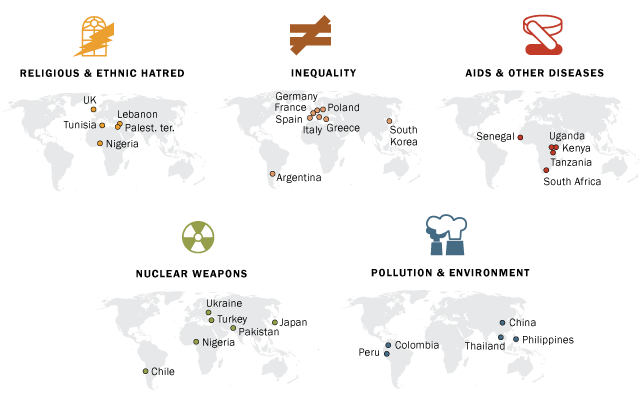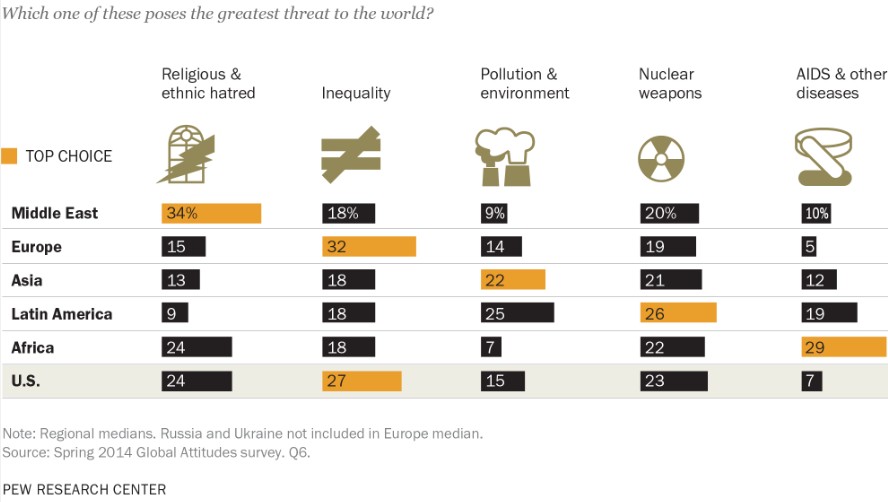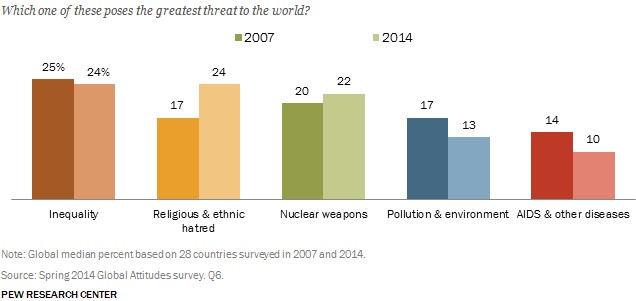The world’s regions view the threats currently faced by the world differently, according to Pew’s 2014 Global Attitudes survey. The survey looked at five major areas of concern and found that some regions worry much more about certain problems than other regions.
The Pew poll included almost 50,000 respondents in 44 countries, and was taken between March and June, 2014. Pew asked participants about five threats: religious and ethnic hatred, inequality, AIDS and other diseases, nuclear weapons, and pollution and the environment.
Europe and the US viewed inequality as the largest threat, according to the research. For Europeans, inequality was by far the greatest threat. For Americans, however, religious and ethnic hatred and nuclear weapons were also seen as significant threats.
The concern over inequality was most pronounced in Spain and Greece, and this concern has doubled in Italy since 2007.
In South Korea and Argentina as well, inequality was at the top. South Korea also worried significantly about the environment and nuclear weapons, and Argentina worried significantly about the environment.
Pollution and the environment were among the main concerns in Asia and Latin America, although Latin America worried most about nuclear weapons.
For Africans, the biggest threat was AIDS and other diseases–particularly in Central and Southern Africa. In Northern Africa, religious and ethnic hatred was the top threat. Only in Nigeria did any threat rank above diseases and hatred–nuclear weapons.
In the Middle East, religious and ethnic hatred was seen to be the biggest threat by far. In Lebanon, for example, almost 60 percent of the population worried about hatred. In the same population, around 20 percent worried about nuclear weapons and inequality, while only 2-3 percent worried about the environment or diseases.
The most scattered area of concern was nuclear weapons. The nations that worried most about nuclear weapons were Chile, Nigeria, Pakistan, Turkey, Ukraine, and Japan–to date the only country to have experienced a nuclear attack.
The world’s regions also differed in what they did not worry about. In the US and Europe, AIDS and other diseases was a minor concern relative to the other threats. The Middle East and Asia also worried about disease far less than Africa and Latin America.
The Middle East and Africa did not worry a lot about pollution and the environment, and Latin America did not worry a lot about religious and ethnic hatred.
Overall, global concern over inequality has decreased since 2007, as has global concern about the environment and diseases. Global concern has, however, risen with regard to nuclear weapons and especially religious hatred.
By Heidi Woolf



